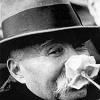Of course not. As always, they somehow managed to bring about the demise of an otherwise successful anarchist movement.
"Otherwise successful" is I suppose the code for "one lacking popular support". I'd also point to the anarchists lack of concrete action in this case, as they decided that channeling "revolutionary action" was wrong. It also interesting to note where these anarchists have ended up, why there's Danny "le rouge" Cohn Bendit, in the Green Party.
Anyway the PCF did not merit the name "communist" at this point, it had some good theorists, some good militants but as a whole it had taken the path of revisionism.
Only the Commies who broke with the Stalinist PCF (partie communiste) , had taken part in their. That's true.
OK so we agree that communists were part of the movement, in a productive way too.
But most Commies just stand by and later joined.
This was, I think, because the PCF had a monopoly of far left thought and action, thus many people who would have wished to join the insurrection were following the "party line".
In L`humanité they wrote in the beginning to stop building barricades, to stop fighting and to return home.
Yep. Because as I said the degenerate PCF (as an institution) was an organic part of bourgeois hegemony by this point.
So did Sartre broke with the Stalinist. Before he was not really keen on them.
The PCF was hardly "Stalinist" at this time. They were pro-Khruschev and those that followed.
All great philosophers and Marxists in France (Poulantzas, Aglietta, Foucault, Lévy-Strauss, Lacan, Derrida, Braudel and lots of others) broke with these Stalinists not only due to the willingness of PCF to stand by de Gaulle, but too to their claim of 'avantgarde'.
Althusser and Balibar remained in, if I remember correctly. But yes a lot of Marxists became "Maoists" just before this period or during it, with good reason. I do not support the PCF's stance very much during the post WW2 period. Like I said the FLN and '68 were the icing on the cake.



























 - By Potemkin
- By Potemkin